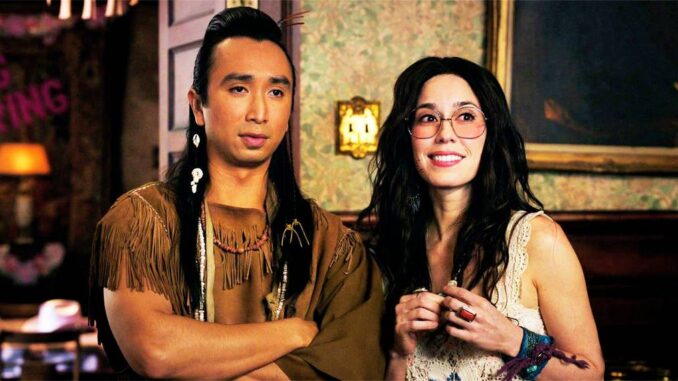
The tapestry of a compelling narrative is often woven from threads laid down long ago, seemingly forgotten, only to resurface with renewed significance. In the intricate universe of Agents of S.H.I.E.L.D., this is demonstrably true for the poignant Season 5 exit of Leopold Fitz. His initial, heartbreaking death, followed by the revelation of his other self frozen in space, gained a profound, almost spectral layer of emotional complexity thanks to the "ghosts" plotline from Season 4, a narrative arc centered around Robbie Reyes, the Spirit of Vengeance, and the forbidden knowledge of the Darkhold.
Season 4 introduced Robbie Reyes, Ghost Rider, and his Uncle Eli Morrow. Eli, corrupted by the Darkhold, gained the ability to create matter, but his experiments inadvertently plunged Robbie into a terrifying liminal existence: trapped between dimensions. He wasn't dead, but he wasn't fully in the living world either. He was a consciousness unmoored, an echo of a person existing in an incomprehensible void. This storyline established a crucial precedent: that death, or rather, absence, wasn't necessarily absolute. One could be "gone" from conventional reality but still exist elsewhere, in a state of suspended animation or interdimensional purgatory.
This "ghosts" plotline, seemingly concluded with Robbie’s sacrifice to banish Eli and himself, left a lingering, almost subconscious, imprint on the show's metaphysical landscape. It cemented the idea that the universe, especially when influenced by powerful artifacts like the Darkhold (which later played a crucial role in creating the Framework, a digital prison for Fitz's mind), was capable of states of being far more complex and agonizing than simple life and death. The Darkhold, a book of forbidden knowledge, repeatedly warped reality, blurred the lines between existence and non-existence, and demonstrated that consciousness could be trapped, fragmented, or displaced. Robbie's "ghostly" entrapment was the first, vivid illustration of this.
Fast forward to Season 5, a narrative arc steeped in a bleak, dystopian future. The S.H.I.E.L.D. team, having been slingshotted through time, faces the impossible task of preventing the Earth's destruction. Fitz, ever the brilliant engineer and dedicated friend, is the heart of the team, his love story with Jemma Simmons a constant, flickering beacon of hope. When the Lighthouse collapses, burying him beneath the rubble, his physical death is a gut-wrenching blow. The raw grief, the tears, the finality – it's all there, a moment of profound, irreversible loss.
Yet, the show introduces a wrenching paradox: because the team time-traveled, there is still another Fitz. A Fitz who never experienced these harrowing events, who is currently frozen in hypersleep aboard a Kree ship, having embarked on a separate journey to save his friends. This "other" Fitz, still alive, still out there, is both a miracle and a torment. Simmons's desperate quest to find him becomes the season's ultimate, driving hope.
Here is where the forgotten ghosts plotline makes its key emotional intervention. The audience, having witnessed Robbie Reyes's interdimensional entrapment, already possesses a framework for understanding existence beyond conventional death. Fitz isn't merely "dead" like any other character. He's gone from this timeline, but his consciousness, his self, still exists, albeit in a different temporal and spatial reality. He is, in a way, a "temporal ghost" – a spectral echo of himself, not truly gone, just displaced.
This precedent transforms the grief surrounding Fitz's "death" from simple loss into a more complex, almost agonizing blend of despair and elusive hope. It's not the finality of a closed casket; it's the torment of knowing a part of him still exists, somewhere, tantalizingly out of reach. The "ghosts" storyline subtly primed the audience to accept and emotionally process this kind of ambiguous absence. We'd already seen a beloved character disappear into a dimension-between-dimensions; the idea of a character existing in a time-between-times becomes less alien, more immediately comprehensible as a unique form of suffering. The emotional weight isn't just "he's dead," but "he's here, but he's also there, and the 'here' version is gone forever, but the 'there' version is still waiting."
The brilliance lies in the subtlety. The show never explicitly references Robbie Reyes or the Darkhold's interdimensional effects during Fitz's exit. But the groundwork was laid. The audience subconsciously understands that the rules of existence, particularly when dealing with cosmic and supernatural forces, are fluid. This allows the narrative to introduce such a devastatingly hopeful, yet tragically paradoxical, fate for Fitz, making his "death" and subsequent "return" (via his other self) not just a plot twist, but an emotionally layered exploration of identity, loss, and the enduring, spectral presence of those we love, even when they seem gone. The "forgotten ghosts" didn't just haunt the edges of the universe; they haunted the very concept of death itself, making Fitz's Season 5 exit a uniquely profound and tear-jerking testament to the enduring power of his spirit, even when fragmented by time and space.